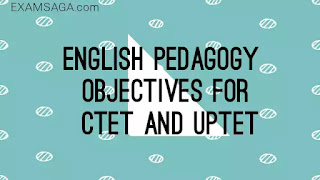English Pedagogy Objectives Part 3
Here ExamSaga provides objective questions of English Pedagogy that are important and often come in exams like ctet and uptet etc. Examsaga also provides chapter wise notes of English Pedagogy. Examsaga also provides chapter wise notes of English Pedagogy.You can download chapterwise notes of English pedagogy by the link given below.
DOWNLOAD ENGLISH PEDAGOGY NOTES
English Pedagogy Objectives
1.After a story telling session the learns are asked to change the ending of the story. This will help the learns
a) Understand grammar better
b) Develop library reference skills
c) Evaluate the teacher’s originality
d) Become imaginative and creative
Ans:d
2.young learns will enjoy a play include in the text book when they
a) Listen to the teacher reading the play
b) Enact the play
c) Get a detailed explanation about play from teacher
d) Read the play silently
Ans: b
3.In learning a new language
a) The knowledge of the mother tongue is helpful
b) The use of mother tongue Interferes rather than facilitates
c) The mother tongue should not be used at all by the learners
d) None
Ans: a
4.Grammar should be taught by
a) Giving clear explanations
b) Enabling practice in the context
c) Asking students to learns rules
d) Making learners do written assignments
Ans: b
5. a video is
a) An audio aid
b) A visual aid
c) An audio- visual aid
d) None of the above
Ans: c
RELATED POSTS:-
6.the grammar –translation method emphasizes
a) Oral fluency
b) Command over speech
c) Use of mother tongue
d) Listening and speaking
Ans: c
7.Structures and patterns are used as a teaching unit in
a) Direct method
b) Structural method
c) the grammar –translation method
d) project method
Ans: b
8.Language learning is related to
a) Knowledge
b) Skill
c) Power
d) Copying
Ans: b
9. Bilingual Method was suggested by
a) Dodson
b) Smith
c) Herbert
d) Redson
Ans: a
10. The productive skills of language are
a) Listening and writing
b) Reading and writing
c) Speaking and listening
d) Speaking and writing
Ans: d